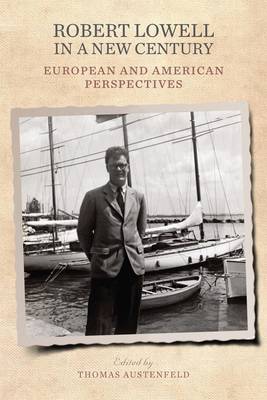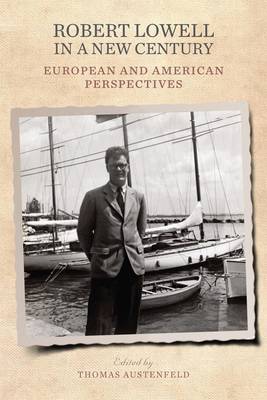
- Afhalen na 1 uur in een winkel met voorraad
- Gratis thuislevering in België vanaf € 30
- Ruim aanbod met 7 miljoen producten
- Afhalen na 1 uur in een winkel met voorraad
- Gratis thuislevering in België vanaf € 30
- Ruim aanbod met 7 miljoen producten
Zoeken
Robert Lowell in a New Century
European and American Perspectives
€ 177,45
+ 354 punten
Omschrijving
New essays providing fresh insights into the great 20th-century American poet Lowell, his writings, and his struggles.
Robert Lowell (1917-1977) holds a place of unchallenged prominence in the poetic pantheon of the twentieth-century United States. He is an essential focal point for understanding the connection between poetry and American history, social justice, and personal identity. A recent spate of publications both by and about him, as well as allusions to him in the work of major American poets such as Wanda Coleman and Claudia Rankine, attest to his continued relevance.
In March 2017, leading Lowell scholars from Europe and America gathered at the University of Fribourg, Switzerland in commemoration of his 100th birthday. The essays deriving from the conference and presented here aftercareful revision reveal new aspects of Lowell: for instance, the poet's influence on his peers, discussed by Thomas Travisano, the biographer of Elizabeth Bishop; or echoes of Milton in Lowell's work, discussed by Saskia Hamilton, editor of the forthcoming Dolphin Letters between Lowell and Elizabeth Hardwick. Other essays examine Lowell's struggles with bipolar illness, with marriage, and with money; his economic views and his early personality issues with respect to his poetic production; his extended sojourn in Amsterdam; and his special relationship with Ireland. Several essays focus on his 1961 volume Imitations, his major poetic engagement with the European tradition, unjustly neglected in the US. The essays will appeal to the wide audience that Lowell scholarship continues to command. Contributors: Steven Gould Axelrod, Massimo Bacigalupo, Philip Coleman, Ian D. Copestake, Astrid Franke, Jo Gill, Saskia Hamilton, Frank J. Kearful, Grzegorz Kosc, Diederik Oostdijk, Francesco Rognoni, Thomas Travisano, Boris Vejdovsky. Thomas Austenfeld is Professor of American Literature at the University of Fribourg.
Robert Lowell (1917-1977) holds a place of unchallenged prominence in the poetic pantheon of the twentieth-century United States. He is an essential focal point for understanding the connection between poetry and American history, social justice, and personal identity. A recent spate of publications both by and about him, as well as allusions to him in the work of major American poets such as Wanda Coleman and Claudia Rankine, attest to his continued relevance.
In March 2017, leading Lowell scholars from Europe and America gathered at the University of Fribourg, Switzerland in commemoration of his 100th birthday. The essays deriving from the conference and presented here aftercareful revision reveal new aspects of Lowell: for instance, the poet's influence on his peers, discussed by Thomas Travisano, the biographer of Elizabeth Bishop; or echoes of Milton in Lowell's work, discussed by Saskia Hamilton, editor of the forthcoming Dolphin Letters between Lowell and Elizabeth Hardwick. Other essays examine Lowell's struggles with bipolar illness, with marriage, and with money; his economic views and his early personality issues with respect to his poetic production; his extended sojourn in Amsterdam; and his special relationship with Ireland. Several essays focus on his 1961 volume Imitations, his major poetic engagement with the European tradition, unjustly neglected in the US. The essays will appeal to the wide audience that Lowell scholarship continues to command. Contributors: Steven Gould Axelrod, Massimo Bacigalupo, Philip Coleman, Ian D. Copestake, Astrid Franke, Jo Gill, Saskia Hamilton, Frank J. Kearful, Grzegorz Kosc, Diederik Oostdijk, Francesco Rognoni, Thomas Travisano, Boris Vejdovsky. Thomas Austenfeld is Professor of American Literature at the University of Fribourg.
Specificaties
Betrokkenen
- Uitgeverij:
Inhoud
- Aantal bladzijden:
- 206
- Taal:
- Engels
- Reeks:
- Reeksnummer:
- nr. 13
Eigenschappen
- Productcode (EAN):
- 9781640140288
- Verschijningsdatum:
- 17/06/2019
- Uitvoering:
- Hardcover
- Formaat:
- Genaaid
- Afmetingen:
- 150 mm x 231 mm
- Gewicht:
- 476 g

Alleen bij Standaard Boekhandel
+ 354 punten op je klantenkaart van Standaard Boekhandel
Beoordelingen
We publiceren alleen reviews die voldoen aan de voorwaarden voor reviews. Bekijk onze voorwaarden voor reviews.










